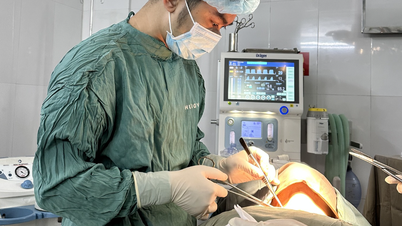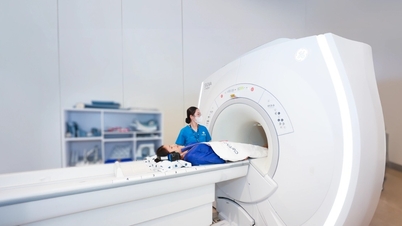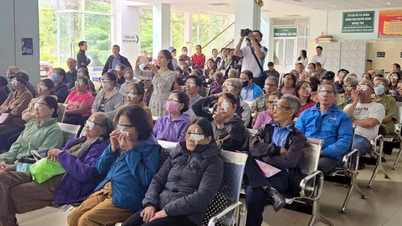If diagnosed with ovarian cancer and wish to have children in the future, women should seek ways to preserve fertility before treatment.
Factors that affect female fertility due to cancer treatment include: age; early menopause; drug dosage or length of treatment. Women undergoing cancer treatment may have to have their reproductive organs, such as the ovaries or uterus, removed; nerve damage, or hormones related to fertility or conception. Some cancer treatments can lead to fertility problems or infertility.
Surgery: Removing the uterus or ovaries can cause infertility. But if only the lower part of the cervix is removed to treat cervical cancer, a woman can still get pregnant.
If ovarian cancer is diagnosed at an early stage or if you have a type of ovarian cancer called a germ cell tumor, it may be possible to get pregnant by removing only one ovary and preserving the uterus. However, surgery to remove tumors near the reproductive organs can cause scarring, which can prevent an egg from traveling to the ovary for fertilization.

Ovarian cancer makes many women worry not only about their health but also about their ability to conceive in the future. Photo: Freepik
Chemotherapy: Some chemotherapy drugs can cause the ovaries to stop producing estrogen or releasing eggs, a condition called primary ovarian insufficiency (POI). This condition can be temporary or permanent. Alkylating drugs often cause POI. Chemotherapy drugs also reduce the number of healthy eggs, causing early menopause and infertility. Infertility is more likely with some chemotherapy drugs, especially when used at high doses or in combination treatments or when combined with radiation therapy.
Radiation therapy: Radiation to the pelvic or lower abdominal area can destroy eggs stored in the ovaries; cause scarring and damage to the uterus, making it impossible for women to carry a pregnancy to term or cause miscarriage. Radiation to the patient's brain can also damage the pituitary gland, which releases hormones necessary for ovulation and cause infertility.
Hormone therapy: Hormone-blocking drugs linked to some cancers can cause infertility, but in some women, fertility returns after treatment ends. However, some hormone therapies cause permanent loss of fertility or birth defects.
Targeted cancer drugs and immunotherapy: Targeted drugs can damage the ovaries. Tyrosine kinase inhibitors have the potential to cause serious birth defects if a woman conceives during treatment.
Bone marrow or stem cell transplants: These treatments involve extensive, high-dose chemotherapy and radiation, which can permanently damage the ovaries.
Because of the harmful effects of cancer treatments on the ovaries and uterus, before starting treatment, patients should talk to their oncologist and obstetrician about issues related to fertility or birth defects if they are pregnant.
Some of the following methods may help patients conceive in the future:
Egg freezing: People who want to have children and need to preserve their fertility can choose to freeze their eggs for in vitro fertilization (IVF) later. The process of freezing eggs and embryos takes about two weeks. This is a very popular method today.
Ovarian tissue freezing: This procedure is used to preserve fertility in pre-pubescent girls. The doctor removes part or all of the ovaries and freezes them. They can be thawed and returned in the future when the woman is ready to conceive.
Ovarian shield: This shield is placed on the lower abdomen to protect the ovaries from damage during radiation therapy.
Ovarian suppression: Your doctor will inject a drug into your body every month to block the hormones that stimulate your ovaries and may protect your eggs from the effects of chemotherapy. You will start taking the drug 1-2 weeks before chemotherapy and continue throughout treatment. You may experience some menopausal symptoms such as hot flashes or vaginal dryness.
Ovarian transposition surgery: This is a technique to move the ovaries away from radiation to nearby tumors. The doctor will perform laparoscopic surgery to protect the ovaries, helping the patient still be able to conceive later.
Gonadotropin-releasing hormone agonist (GnRHa) therapy : This treatment stops a woman's body from making estrogen and progesterone, protecting the ovaries during cancer treatment.
As You Wish ( According to WebMD )
Source link


![[Photo] General Secretary To Lam receives US Ambassador to Vietnam Marc Knapper](https://vphoto.vietnam.vn/thumb/1200x675/vietnam/resource/IMAGE/2025/9/29/c8fd0761aa184da7814aee57d87c49b3)
![[Photo] General Secretary To Lam, Secretary of the Central Military Commission attends the 12th Party Congress of the Army](https://vphoto.vietnam.vn/thumb/1200x675/vietnam/resource/IMAGE/2025/9/30/9b63aaa37ddb472ead84e3870a8ae825)
![[Photo] The 1st Congress of Phu Tho Provincial Party Committee, term 2025-2030](https://vphoto.vietnam.vn/thumb/1200x675/vietnam/resource/IMAGE/2025/9/30/1507da06216649bba8a1ce6251816820)
![[Photo] Solemn opening of the 12th Military Party Congress for the 2025-2030 term](https://vphoto.vietnam.vn/thumb/1200x675/vietnam/resource/IMAGE/2025/9/30/2cd383b3130d41a1a4b5ace0d5eb989d)





























![[Photo] General Secretary To Lam attends the ceremony to celebrate the 80th anniversary of the post and telecommunications sector and the 66th anniversary of the science and technology sector.](https://vphoto.vietnam.vn/thumb/1200x675/vietnam/resource/IMAGE/2025/9/29/8e86b39b8fe44121a2b14a031f4cef46)

































































Comment (0)